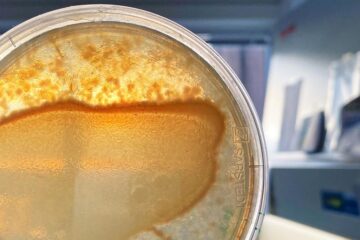HypoPlant – Production of hypo-allergenic glycoproteins in plants

Glycoproteins (GPs) are of prime interest in medical sci-ence. However, the production of GPs by standard methods is still complex and expensive. Plants have been suggested as potential cost-effective and safe GP-production systems; however, major differences in the final steps of biosynthetic pathways in mammals and plants lead to different glycosylation patterns, provoking an immune response when treating humans with GPs produced in plants.
Challenge State-of-the-art approaches utilize glycosylation mutants or overexpression of the desired protein product (intending to override the cellular glycosylation machinery), although such mutants either show impaired yield or loss of vitality in com-parison to wild type. Also, rarely glycan components termi-nate in mannose residues, which is essential for uptake via mannose receptors in patients with lysosomal storage dis-eases. This invention provides a new tool to generate GPs with hypo-allergenic properties in a cost-effective way: In con-trast to current methods, the new technique enables effec-tive production of heterologous GPs by vital plants without impair¬¬ments. The technology is based on genetic modifica-tion of the plant glycosylation pathway. The technology is applicable to Solanaceous and other plants of agronomical interest. Suppression of a specific enzyme results in a general reduction of cross-reactive car-bohydrate determinants (CCD) in all tissues, leading to GPs that are better tolerated and taken up by humans.
Weitere Informationen: PDF
PROvendis GmbH
Tel.: +49 (0)208/94105 10
Ansprechpartner
Dipl.-Ing. Alfred Schillert
Media Contact
Alle Nachrichten aus der Kategorie: Technologieangebote
Neueste Beiträge

Das Mikrobiom verändert sich dynamisch und begünstigt wichtige Funktionen für den Wirt
Ein interdisziplinäres Forschungsteam des Kieler SFB 1182 untersucht am Beispiel von Fadenwürmern, welche Prozesse die Zusammensetzung des Mikrobioms in Wirtslebewesen steuern. Alle vielzelligen Lebewesen – von den einfachsten tierischen und…

Wasser im Boden – genaue Daten für Landwirtschaft und Klimaforschung
Die PTB präsentiert auf der Woche der Umwelt, wie sich die Bodenfeuchte mithilfe von Neutronenstrahlung messen lässt. Die Bodenfeuchte hat nicht nur Auswirkungen auf die Landwirtschaft, sondern ist als Teil…

Bioreaktor- und Kryotechnologien für bessere Wirkstofftests mit humanen Zellkulturen
Medizinische Wirkstoffforschung… Viele Neuentwicklungen von medizinischen Wirkstoffen scheitern, weil trotz erfolgreicher Labortests mit Zellkulturen starke Nebenwirkungen bei Probanden auftreten. Dies kann passieren, wenn zum Beispiel die verwendeten Zellen aus tierischem…

















